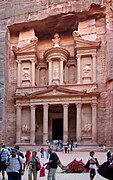  Jordan, officially the Hashemite Kingdom of Jordan, is a country in the Southern Levant region of West Asia. Jordan is bordered by Syria to the north, Iraq to the east, Saudi Arabia to the south, and Israel and the occupied Palestinian territories to the west. The Jordan River, flowing into the Dead Sea, is located along the country's western border. Jordan has a small coastline along the Red Sea in its southwest, separated by the Gulf of Aqaba from Egypt. Amman is the country's capital and largest city, as well as the most populous city in the Levant. Modern-day Jordan has been inhabited by humans since the Paleolithic period. Three kingdoms developed in Transjordan during the Iron Age: Ammon, Moab and Edom, which were conquered by the Assyrian and later Babylonian empires. In the third century BC, the Arab Nabataeans established their kingdom centered in Petra. The Greco-Roman period saw the establishment of several cities in Transjordan that comprised the Decapolis. Later, the Islamic era began after end of Byzantine rule that set off Islamic empires of the Rashidun, Umayyad, Abbasid, and the Ottoman. Following the 1916 Great Arab Revolt during World War I, former Ottoman Syria was partitioned, leading to the establishment of the Emirate of Transjordan in 1921, which became a British protectorate. In 1946, the country gained independence and became officially known as the Hashemite Kingdom of Jordan. The country captured and annexed the West Bank during the 1948 Arab–Israeli War until it was occupied by Israel in 1967. Jordan renounced its claim to the territory to the Palestinians in 1988 and signed a peace treaty with Israel in 1994. Jordan is a semi-arid country, covering an area of 89,342 km2 (34,495 sq mi) with a population of 11.5 million, making it the eleventh-most populous Arab country. The dominant majority, or around 95% of the country's population, is Sunni Muslim, with the rest being mostly Arab Christian. Jordan was mostly unscathed by the violence that swept the region following the Arab Spring in 2010. From as early as 1948, Jordan has accepted refugees from multiple neighbouring countries in conflict. An estimated 2.1 million Palestinian refugees, most of whom hold Jordanian citizenship, as well as 1.4 million Syrian refugees, were residing in Jordan as of 2015. The kingdom is also a refuge for thousands of Christian Iraqis fleeing persecution. While Jordan continues to accept refugees, the large Syrian influx during the 2010s has placed substantial strain on national resources and infrastructure. The sovereign state is a constitutional monarchy, but the king holds wide executive and legislative powers. Jordan is a founding member of the Arab League and the Organisation of Islamic Cooperation. The country has a high Human Development Index, ranking 99th, and is considered a lower middle income economy. The Jordanian economy, one of the smallest economies in the region, is attractive to foreign investors based upon a skilled workforce. The country is a major tourist destination, also attracting medical tourism with its well-developed health sector. Nonetheless, a lack of natural resources, large flow of refugees, and regional turmoil have hampered economic growth. (Full article...) Arab Bank is a Jordanian bank that is one of the largest financial institutions in the Middle East. It is headquartered today in Amman, Jordan, and operates as a universal bank that serves clients in more than 600 branches spanning five continents. Arab Bank is a publicly held shareholding company listed on the Amman Stock Exchange. The bank is a major economic engine in Jordan and throughout the Middle East and North Africa region, providing banking services and capital, and facilitating development and trade throughout the region. According to its website in 2018, the bank was the highest-ranked by market capitalization, and represented approximately 25% of the Amman Stock Exchange. (Full article...) Abdullah El Tell (Arabic: عبدالله التل, 17 July 1918 – 1973) served in the Transjordanian Arab Legion during the 1948 war in Palestine rising from the rank of company commander to become Military Governor of the Old City of Jerusalem. He was later accused of being involved in the assassination of King Abdullah I−which he denied−and spent many years in Egypt before returning to Jordan in 1967. (Full article...) For editor resources and to collaborate with other editors on improving Wikipedia's Jordan-related articles, see WikiProject Jordan. The following are images from various Jordan-related articles on Wikipedia.
Anjara (Arabic: عنجرة) is an ancient town located at northern Jordan in the Ajloun Governorate. The city is situated 4 kilometers to the south of Ajloun, and 73 kilometers to the north of the Jordanian capital Amman. (Full article...)
See also: List of cities in Jordan
Religions in Jordan Arab states Other countries
Featured articlesGood articles
An aerial view of part of the Zaatari refugee camp, which houses Syrian refugees, in July 2013. The following Wikimedia Foundation sister projects provide more on this subject:
Discover Wikipedia using portals |
































































